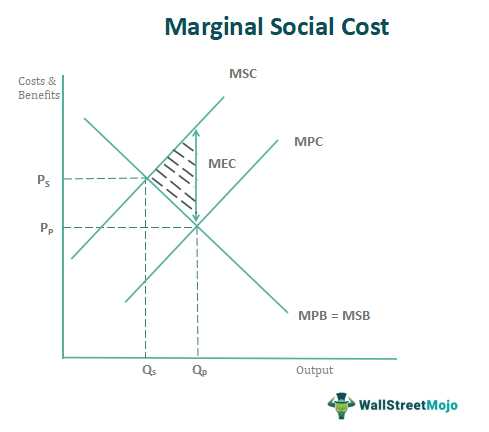Definition of Marginal Social Cost (MSC)
The Marginal Social Cost (MSC) is a concept in economics that measures the additional cost imposed on society as a whole for producing one more unit of a good or service. It takes into account both the private costs borne by the producer and the external costs imposed on third parties.
Private costs refer to the expenses incurred by the producer in the production process, such as labor, raw materials, and capital. These costs are directly borne by the producer and are reflected in the price of the good or service.
External costs, on the other hand, are the costs imposed on third parties who are not directly involved in the production or consumption of the good or service. These costs can include pollution, congestion, noise, and other negative effects on the environment or society.
The Marginal Social Cost is calculated by adding the private costs and the external costs together. It provides a more comprehensive measure of the true cost of production, as it takes into account the negative impacts on society that are not reflected in the market price.
By considering the Marginal Social Cost, policymakers and economists can assess the overall social welfare implications of producing additional units of a good or service. It helps in making informed decisions about the optimal level of production and consumption, taking into account the externalities and the costs imposed on society.
Formula for Calculating Marginal Social Cost (MSC)
The Marginal Social Cost (MSC) is a concept in economics that measures the additional cost imposed on society for producing one more unit of a good or service. It takes into account both the private costs borne by the producer and the external costs imposed on society.
The formula for calculating the Marginal Social Cost (MSC) is:
| MSC | = | MC | + | MEC |
|---|
Where:
- MSC represents the Marginal Social Cost
- MC represents the Marginal Cost, which is the additional cost of producing one more unit of a good or service
- MEC represents the Marginal External Cost, which is the additional cost imposed on society due to external factors such as pollution or congestion
The Marginal Cost (MC) is the cost incurred by the producer, including factors such as labor, materials, and equipment. It represents the private cost of production.
The Marginal External Cost (MEC) captures the additional cost imposed on society as a whole. This includes costs that are not borne directly by the producer, but by society in general. Examples of external costs include pollution, traffic congestion, and depletion of natural resources.
By including both the private cost and the external cost, the Marginal Social Cost provides a more comprehensive measure of the true cost of production. It helps policymakers and economists make informed decisions about resource allocation and environmental regulation.
Calculating the Marginal Social Cost is essential for determining the optimal level of production and consumption, as it allows for the consideration of the broader social impacts of economic activities.
Example of Marginal Social Cost (MSC) in Economics
In economics, the concept of Marginal Social Cost (MSC) is used to measure the additional cost imposed on society as a result of producing one additional unit of a good or service. It takes into account both the private cost incurred by the producer and the external costs imposed on society.
Scenario:
Let’s consider a hypothetical example of a factory that produces plastic bottles. The factory emits pollutants into the air and water as a byproduct of its production process. These pollutants have negative effects on the environment and public health, which are considered external costs.
The factory currently produces 1,000 plastic bottles per day. The private cost of producing each bottle is $1. However, the external costs associated with the pollution caused by the factory are estimated to be $0.50 per bottle.
Calculating Marginal Social Cost (MSC):
To calculate the Marginal Social Cost (MSC) of producing an additional plastic bottle, we need to consider both the private cost and the external cost.
Private Cost (PC): $1
External Cost (EC): $0.50
Marginal Social Cost (MSC) = Private Cost + External Cost
Marginal Social Cost (MSC) = $1 + $0.50
Marginal Social Cost (MSC) = $1.50
Therefore, the Marginal Social Cost (MSC) of producing one additional plastic bottle is $1.50.
Implications:

The concept of Marginal Social Cost (MSC) is important in economics as it helps to capture the true cost of production by considering the external costs imposed on society. By incorporating these external costs, policymakers and economists can make more informed decisions regarding the optimal level of production and the implementation of regulations to internalize these costs.
In the case of the plastic bottle factory, if the Marginal Social Cost (MSC) exceeds the private cost, it indicates that the production of additional bottles is imposing a net cost on society. This could prompt policymakers to implement measures such as pollution taxes or stricter regulations to reduce the external costs and promote more sustainable production practices.

Emily Bibb simplifies finance through bestselling books and articles, bridging complex concepts for everyday understanding. Engaging audiences via social media, she shares insights for financial success. Active in seminars and philanthropy, Bibb aims to create a more financially informed society, driven by her passion for empowering others.
